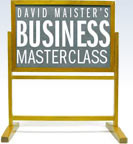

TITLE | TIME |
How to Create A Strategy | (14:55) |
What is a Strategy and How Do You Develop One? This episode explains the sources of competitive advantage, and describes a process to be followed to identify a competitive strategy.
RELATED RESOURCES:
Blog discussions
NOTES FOR THE EPISODE:
In this first seminar in David Maister’s new series, Strategy in Professional Businesses, we will discuss what exactly strategy is in a professional business as well as who should be doing the creative strategic thinking and action-planning.
Timeline:
01:06 —
You must actually be clever enough to change your company’s methods of delivering services so that client (or customers) derive additional benefits from your approach compared to that of your (best) competitors. How can this be done? Here are eight of the major alternatives, phrased as questions your organization needs to ask itself .
- Can we develop innovative approaches to HIRING that render more value to clients by attracting a higher caliber of staff than the competition?
- Can we TRAIN our people better, so that they are more valuable than a competitors’ people would be?
- Can we give our people innovative METHODOLOGIES so that we either enhance the value of our service delivery or deliver a higher quality for lower cost?
- Can we be systematic in ensuring that our people are superior at CLIENT COUNSELING, in addition to being top technicians?
- Can we outperform our competitors in accumulating, disseminating and delivering to the clients outr accumulated firmwide expertise, so that when they hire one of us, they get the benefits of all of us?
- Can we organize and specialize our people in new wways so that by focusing they develop superior skills suited to a specific market segments’ needs?
- Can we outperform our competitors at understanding what clients really value, by putting in place superior “Listening to the Clients programs” that keep us better informed about the clients’ business and their emerging needs?
- Can we become more valuable to clients through superior research and development of new services or new delivery approaches?
03:25 —
Strategy is fundamentally about getting BETTER at what you do. It’s nor primarily about getting bigger (although that can be the consequence of getting better.) Nor is it about doing different things than in the past.
There is a natural, but regrettable, tendency for companies, in their strategy development processes, to focus on new things:
05:41 —
Who Should Develop The Strategy?
One of the most unfortunate myths about the strategy development process is that it is the responsibility of the company leadership, or a companywide committee, to develop a strategic plan and then persuade or “sell” the rest of the firm to following that vision.
12:30 —
What is important about this strategy development process is that it represents not just a one-time event, but a shift in the ongoing management processes of the company.
It puts in place a “conscience” mechanism which forces each business area to consider (and, over time, reconsider) how it is operating, where it is going and how it plans to compete.
- In what way are your investment priorities likely to be different from those of the competitors?
- What is the one most significant thing (each) that the main competitors are doing that will affect you? What do you plan to do in response?
- How do you know the clients will like what you’re planning? What field testing have you done? What client input have you obtained?
- Who, specifically, is going to do this? Which of their other activities are they going to give up? Who’s going to do those?
- In what way do you plan to take advantage of the firmwide network? How do you plan to get the cooperation of others?
- What are the staffing implications of your plans?
- What are the main assumptions on which your plan is based? Which is the most “risky”? (i.e. if it can go wrong, where will it go wrong?)
- Who was involved in the development of this plan? Is everyone in agreement? (Who was not consulted? Do they have a role in executing the plan?)
- On whom will you be dependent for the execution of this plan? Do they have sufficient incentive to do their part? Is it in their interests to do what you want? Do you have to modify your reward systems to make this happen?
- What early warning signals will there be if the plan is not working? What contingencies have you put in place?
13:57 —
This concludes HOW TO CREATE A STRATEGY the first seminar in my series, Strategy in Professional Businesses. Future seminars in this series will focus on�
This particular seminar was adapted from David Maister’s book, Managing the Professional Service Firm and in the ongoing discussion at his blog, Passion, People and Principles. The two previous podcast series, Marketing Professional Services and Managing Professionals. Attitudes, Skills, and Behaviors, are also available from this page.


















